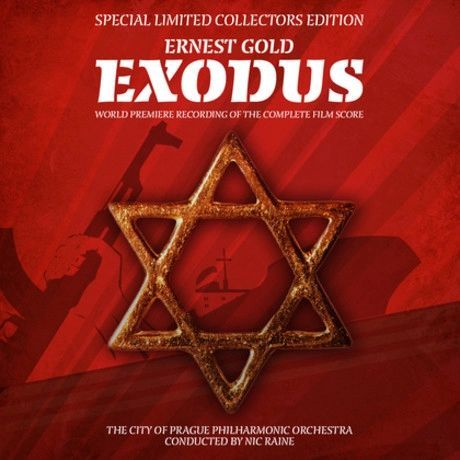Exodus

Label: Tadlow Music
Catalogue No: TADLOW007
Release Date: 9-Sep-2009
Total Duration: 2 CDs 61:49 / 70:58
UPN: 6-2657-06014-5-6
Following on from Tadlow’s epic recording of EL CID, the same team – Nic Raine conducting and James Fitzpatrick producing – have turned their attention to a completely different type of epic film for the definitive recording of Ernest Gold’s Academy Award winning score for Otto Preminger’s EXODUS (1960). The score is something of a revelation because aside from the main theme, the music has received little attention through recordings. Additionally the sound quality of the original soundtrack LP was disappointing and much music was deleted or cut from the film.
The “Prelude” introduces Gold’s main theme. The theme – one of the most well known and oft recorded pieces of music, albeit often in sentimentalised or easy listening versions, is heard here in its sturdy and noble sounding film version. Despite the familiarity of the EXODUS theme, it is not overly used within the score and, when it is used, its familiarity is lessoned by going through many different variations. There are affecting arrangements in “Ari” and “Akiva’s Hideout” but it is in the cue “The Valley of Jezreel” where it receives a more extensive treatment. An extremely melodic theme is that which is used to represent Karen, heard first in “The Tent” on solo accordion, before taken up by the full orchestra. The theme is also used most effectively and gently in “Karen’s Father”. In contrast, action scenes are handled with full blown orchestral fury as in “The Bombs”. The two disc set includes the very fine “Rhapsody for Cello and Orchestra” and “Concert Overture” arranged from the score as well as Gold’s ”Exit Music” from IT’S A MAD, MAD, MAD, MAD WORLD and selections from films addressing a similar theme to that of EXODUS; SHIP OF FOOLS, JUDITH, QB VII, SCHINDLER’S LIST and CAST A GIANT SHADOW; making this an extremely good value package indeed.
This recording proves EXODUS to be a masterful score of considerable variation. There is even some cocktail music in “Kitty” to provide a spot of light alternative! The score is suffused with music of great vitality and feeling and the sound quality is exemplary. The City of Prague Philharmonic Orchestra play supremely well with total confidence. It’s also good to have the Intermission and Exit music, both of which, incidentally, are missing from the current DVD. As an added bonus the disc set also includes two videos taken at the recording sessions. The 24 page booklet has introductory notes by Marni Nixon who was married to Gold and her reminiscences of the recording sessions are fascinating. The bulk of the booklet is by musicologist Frank DeWald whose track by track analysis is excellent. These are the sort of notes which, when read whilst listening to the CD, add so much to an understanding and appreciation of the music.



